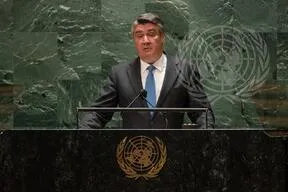Statement
Statement summary
ZORAN MILANOVIĆ, President of Croatia, said this moment in history calls for “hope above all”. With violence, poverty and hunger rising, uneven global development, and other challenges including natural disasters and migration, there are few if any alternatives to multilateralism, global solidarity and international cooperation. Calling the pandemic “a historic test for this generation”, he cited a resolution co-coordinated by his Government with Afghanistan, which set the stage not only for recovery, but building back better. As an upcoming member of the Economic and Social Council (2022-2024), Croatia will foster a stronger multilateral response to the pandemic, in the spirit of global solidarity, with safe and effective vaccines made more accessible without discrimination.
Turning to “our south-east neighbourhood”, he emphasized the importance of stability, functionality and prosperity in the Western Balkans, with Croatia advocating for its European Union enlargement prospects. However, fulfilling well-established criteria and implementing reforms remain key requirements. While Bosnia and Herzegovina is a cornerstone of regional peace and security, he called its situation “as challenging and as complex as it gets” in the Western Balkans.
Expressing hope for a stable, peaceful and prosperous Croatia on the path to European Union membership, he spotlighted political narratives there which often “swing between two tenaciously unachievable and unjust ends — centralized governance and separatism”. The inequality of its constituent peoples (Bosniaks, Serbs and Croats) has been left unresolved for too long, he noted, unnecessarily creating internal political instabilities. While long overdue and urgent electoral reforms should ensure that all peoples are able to choose their representatives, he noted Croats in the country have not been able to exercise this right. “This has to change”, he emphasized.
After the collapse of Afghanistan’s Government, he noted the key question now is how to deal with the Taliban. A pragmatic approach will not be easy, as the international community rightfully calls upon those in power to respect fundamental rights. Amid concerns that Afghanistan may once again become a breeding ground for terrorism, he cited Croatia’s financial support for the United Nations Office for the Coordination of Humanitarian Affairs in providing humanitarian support. As the Middle East peace process is crucial not just regionally but globally, he said the two-State solution, based on internationally agreed upon parameters, remains viable. Reviving the Iran nuclear deal is also a key instrument of regional security and stability. Similarly, although the Libyan crisis may be winding down, he noted a lasting peace there will remain complicated.
Citing the importance of reforming the United Nations, especially the Security Council, he called on all Member States yet to ratify the Rome Statute, to do so. Noting that Croatia is still searching for 1,858 of its citizens missing or unaccounted after the 1991-1995 Croatian War of Independence, he urged neighbouring States to cooperate in good faith and respect their declared commitments and international agreements.
Full statement
Read the full statement, in PDF format.
Photo

Previous sessions
Access the statements from previous sessions.
